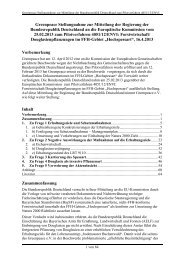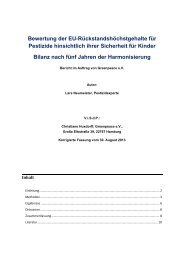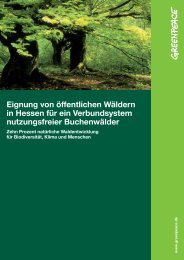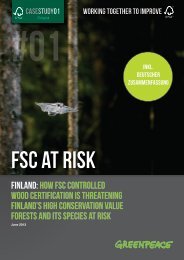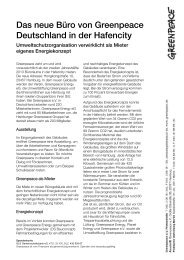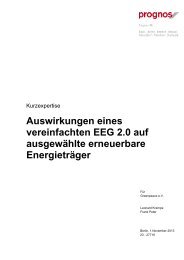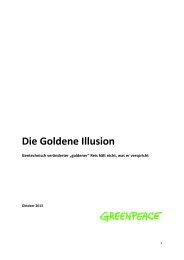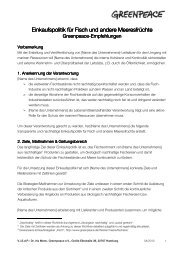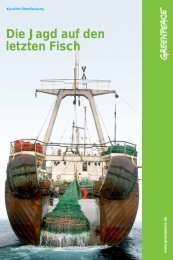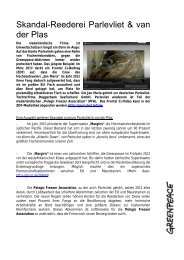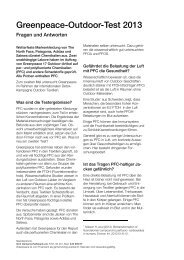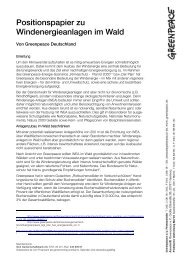Untitled - Greenpeace
Untitled - Greenpeace
Untitled - Greenpeace
Create successful ePaper yourself
Turn your PDF publications into a flip-book with our unique Google optimized e-Paper software.
EXECUTIVE SUMMARY: WHAT A CARVE UP – KEY FACTS ABOUT DRC RAINFOREST DESTRUCTION<br />
AND KEY QUESTIONS FOR THE WORLD BANK 1<br />
Putting it all in perspective 1<br />
What’s at stake? 2<br />
What impact has the World Bank had in the DRC? 2<br />
Has it brought the logging industry under control and slowed its expansion? 2<br />
A review of the 156 contracts under review – <strong>Greenpeace</strong>’s key findings: 3<br />
Challenges for the Legal Review 4<br />
Has it raised money for development and provided public services to forest dwelling communities? 5<br />
Has it achieved rainforest protection for people, wildlife and the global environment? 6<br />
What future for the DRC’s rainforests? 7<br />
THE WORLD BANK CONDONES LOGGING AS A POTENTIAL QUICK FIX … IN THE NAME OF DEVELOPMENT 10<br />
The DRC: largest stronghold of Central Africa’s globally significant Congo rainforests 12<br />
The battle for the DRC’s resources: winners and losers 13<br />
After the war, a new fight for control of the rainforest 14<br />
DRC rainforest destruction: The World Bank is a powerful player 16<br />
The World Bank holds the purse strings but who calls the shots? 16<br />
<strong>Greenpeace</strong> investigations expose the flaw in World Bank strategy 17<br />
Taxes or private income? 17<br />
Social responsibility contracts are little more than licences to loot 17<br />
The reform process: a catalogue of delays and failures 18<br />
Without enforcement, World Bank-led forestry initiatives can make poverty worse 22<br />
The moratorium has failed to prevent millions of hectares of logging titles being awarded 23<br />
Nord-Sud timber cashes in on 3 million hectares of rainforest in breach of the moratorium 24<br />
The Legal Review: will it launder illegal titles and leave corruption unchallenged? 26<br />
The World Bank leaves the implementation of measures to mitigate social and environmental impacts largely to the industry itself 27<br />
ITB sees forest management plans as a paper exercise ‘to please the World Bank’ 28<br />
Unimplemented and unenforced, the Forestry Code will not stop rainforest plunder or contribute to poverty alleviation 30<br />
CON IN THE CONGO – THE MORAL BANKRUPTCY OF THE WORLD BANK’S INDUSTRIAL LOGGING MODEL 32<br />
Industrial logging is sustaining corruption in the DRC 33<br />
How do tax breaks for Trans-M’s rainforest plunder support poverty alleviation? 34<br />
ITB gets its logging titles thanks to friends in high places 35<br />
NST ‘enjoys the protection of top political authorities’ from law enforcement 36<br />
Has NST been rewarded for its wartime contribution? 36<br />
Will politically ‘protected’ operations pass the legal review? 37<br />
The World Bank group and German Government fund Olam’s illegal logging operations 38<br />
Logging in rebel-held territory – paying the ‘administration’ 40<br />
Industrial logging-led poverty alleviation is a charade 42<br />
Tipping the scales: the cost of industrial logging far outweighs its contributions to development 43<br />
Logging at Lake Tumba is destroying forest community resources 44<br />
Further social exclusion for hunter-gatherer communities 45<br />
Tree of Life: indigenous uses for the Sapele Tree 45<br />
Taxing credibility: the revenue from logging will not go far… from Kinshasa 46<br />
‘Social responsibility contracts’ – the charity of loggers is a poor substitute for genuine development 48<br />
Trans-M’s deals are a ‘swindle’ 50<br />
Trans-M’s illegal logging is causing conflict in Lomako 50<br />
Trans-M is destroying community forest resources in Kisangani 51



